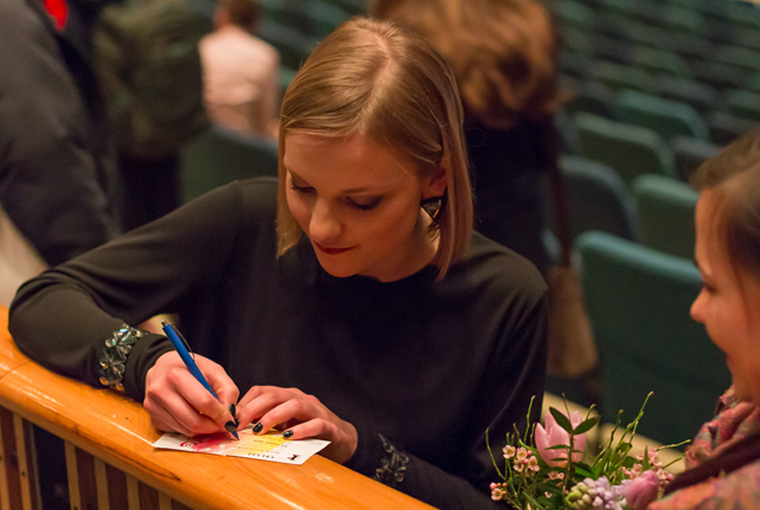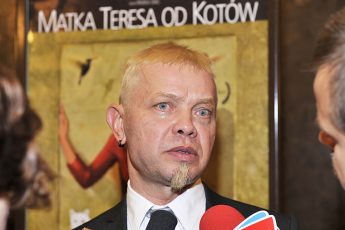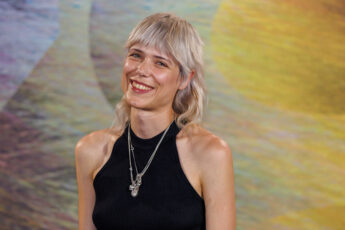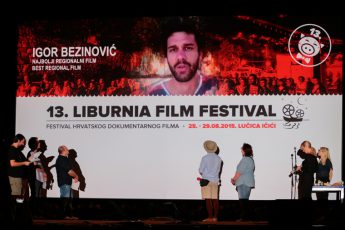
Actress Elīna Vaska speaks about Renars Vimba’s “Mellow Mud”, a Latvian coming-of-age drama in which she played the lead role.
So what is “Mellow Mud” about?
It’s a story about a very strong and independent young woman. She’s 17, but almost from the very beginning of the film, she’s very independent and strong, basically already grown-up. After she goes to London and comes back, that’s where I feel like she’s really grown up. In the past years in Latvia, we’ve had a few coming-of-age dramas. But this one, Mellow Mud, is the only one of these coming-of-age dramas where the main character is a woman.
Why do you think it took a long time for there to be a film about a young woman growing up?
It takes time and it’s hard to fight for your idea. You have this script, and you have to get money. And the only place to get money is from the National Film Commission. It took Renārs Vimba [the director] about five years, with shooting/filming. I guess all of these young directors want to talk about their life experiences. Not all of them, but most of them write a script and are also directing. But for Renars, he wanted the main hero – he thought it might be a young boy, but somehow he couldn’t imagine a young boy there living in the countryside. He feels that women in Latvia are stronger than men.
In the film, your character’s relationship to her little brother is interesting – she has to take on a mothering role, yet she totally rejects being a maternal figure.
It’s true, she has to take care of herself and the house, focus on her studies and also take care of her brother. But she feels somewhat resentful of it because she doesn’t have anyone to take care of her. And then comes this teacher, and I think the only reason why she ends up falling for him is because she thinks that he might be able to take care of her. But that doesn’t really end up happening.
So do you see yourself in this character at all?
Yes, definitely. In theater, you’re with a troupe or a group of actors, and they’re given roles and they just do them unquestioningly. They’re assigned characters to take on, but in film casting it is a bit different. When you read a script you’re looking for something very specific, whether that’s appearance or personality, or both. Renars and I both felt that I shared some common characteristics with the main character, Raja. For example, I am very driven, which is the main link. If I feel like it’s worth doing something, I will just go for it. Overall, it’s a good personality trait to have, although sometimes I do think that by being so focused you can miss out on what’s happening around you…
You mean like how Raja misses what’s happening with her brother?
Yeah, and also you miss out on enjoying what life has to offer.
Are you from a similar background? Are you from a rural background in Latvia?
No, well yes. I was born in Riga and then my parents decided they wanted to move the family to the countryside. They had a very romantic notion about living in a big house and raising the family there. So they did, and they’re still there. I eventually left to pursue my studies. But how I grew up is totally different from how Raja grew up. It was hard for me to imagine how hard it could have been growing up in such circumstances. When we first started shooting, we went around to different locations and I visited Raja’s house. I walked outside and around the house, and felt a very strong feeling of what it must have been like to live there. I absorbed that feeling very naturally, of living there and feeling like, ‘this is all she had.’
I have to say, your performance is very good, and one thing I noticed that doesn’t happen in very many coming-of-age movies is that Raja tried out many different personas. In the beginning of the film, she seems like a bit of a delinquent; she’s not doing her homework… But then you see later that when she has the chance to go to London you see a whole new side of her; the way she is with her teacher, I think you see something very different there. Did you have that in mind, that she would be very changeable?
Yes, we had a few rehearsals, and I had the old script just one month before we started shooting. Of course, Renars wrote that script and I trust him. But sometimes when directors work with younger actors they’re afraid that they will memorize them so thoroughly that their delivery will be stiff and unnatural. But I don’t agree. I asked him to give me the script right away because I wanted to get to know Raja. He and I both realized then that I’m not only an actress who does what the director tells her to do – I am also an author of my craft. It was important to me that I not be someone who just takes orders. I was lucky to work with Renars because it was very collaborative – we talked about it a lot, and he was always asking for my opinion. One thing that I was worried about was that the script would appear very flat and one-dimensional because the character is pretty stoic, and goes through much of the film with the same face. But there are many minute changes – not as much through facial expressions, but rather through actions and words, etc. And when she meets the teacher, she definitely feels like she is in love for the first time. I don’t think she is actually in love, but more that she feels like she is meeting someone who will take care of her. She realizes there are good things in life and that not everything is negative.
Here’s a bigger question: how do you see Baltic cinema evolving? You said there are a fair amount of coming-of-age films coming out; is there a general feeling in the Latvian film circles that these movies will be big?
Well, Mellow Mud was the last in the string of those popular coming-of-age films, but now I think there’s a change. Directors are more interested in other genres.
Independence has changed the film industry in Latvia greatly. Lithuanians are more into developing big, commercial productions and Latvians are more focused on improving and developing films that are independent and tell a story of the country instead of just happening to be shot in Latvia. Now, Latvia is very good at co-production. There used to be about four feature films per year, which seems like nothing, but at the same time we’re just about 2 million people in Latvia, so 4-5 films per year is a big deal. For 2018, the film budget has increased so we’ll probably have 6-8 films out because of the country’s independence anniversary. The country won its independence in 1918, so it’s the 100th anniversary of our independence. So next year will be a big celebration for the Latvian audience – those six films are like a big gift to the country.
So every feature made in Latvia will be supported by the state?
Yes, but it’s very important to co-produce with other countries. With Mellow Mud we had to get money from Latvia’s National Film Center so that they could co-produce with Iceland. Other countries will only help fund your film if your own country has already promised a sum of money, whether it’s 1,000 euros or 400,000 euros. At first the money is allocated to the director to fund the script, because obviously it’s the starting point for a film.
What about your next project? Are you working on more films or theater?
I just had my theater debut this past season. I originally thought I didn’t want to be on-stage or in theater, but Gennadiy Ostrovskiy, a Russian director who happened to be in Latvia, saw Mellow Mud and wanted to offer me a role – to play an adolescent boy with a speech impediment. At first, he wrote the script for film (shot in Russia in 2002), but then he adapted it for the stage.
I’d rather not talk very much about films beforehand. When I see myself on the screen, I’ll do an interview at that point.
Thank you for the interview.




Leave a Comment